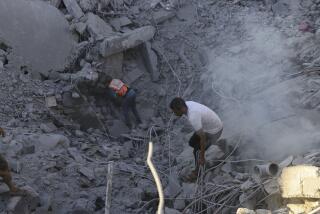Clinton Assails Israeli Housing as Arafat Visits
- Share via
WASHINGTON — President Clinton waded back into the Mideast peace process Monday, criticizing Israel’s decision to build housing on the outskirts of East Jerusalem as a move that “builds mistrust” and meeting with Palestinian Authority President Yasser Arafat at the White House.
Before starting his meeting with Arafat, Clinton said of the planned Israeli development: “I wish [the decision] had not been made. I don’t think it builds confidence, I think it builds mistrust.”
While the Clinton administration’s opposition to the East Jerusalem housing project was known, these were the president’s first comments since the controversial project won Israeli government approval last week.
Clinton’s remarks came as tensions mounted in the Middle East, with Palestinians calling a general strike in the West Bank and Gaza Strip to protest the housing project.
Meanwhile, Israeli Prime Minister Benjamin Netanyahu toured East Jerusalem to underline his government’s stated commitment to invest in housing and other infrastructure for Palestinians, even as Israel builds 6,500 homes for Jews on a hill on the city’s southeastern boundary.
“What we are doing today is making . . . Jerusalem one city for Jews and Arabs alike,” the prime minister said. “We are serious about it. It’s not a ploy.”
But the housing project Netanyahu describes as a simple step toward making Jerusalem a single, integrated city is seen by Palestinians as an attempt to preempt negotiations on the final status of the city, which is viewed as holy by both Palestinians and Jews and claimed by both as their capital. As such, the city’s fate is one of the most emotional issues of the peace process.
Clinton likened the darkened mood caused by Israel’s decision to build the housing for Jews to a period last fall when he invited Netanyahu, Arafat and Jordan’s King Hussein to an emergency White House summit to breathe new life into the peace process. That process had stalled over the terms of Israel’s withdrawal from the West Bank city of Hebron. “This is also a difficult moment, but I think we can work through it and go forward,” Clinton said.
After his session with Clinton, Arafat met with Secretary of State Madeleine Albright. The two agreed to form a joint U.S.-Palestinian committee that will meet several times a year. State Department officials said the committee, chaired by Albright and Arafat, is patterned after existing panels established to monitor America’s relations with Russia, South Africa and Egypt.
Arafat’s itinerary--which also included meetings Monday with Treasury Secretary Robert E. Rubin and the director of U.S. foreign aid efforts, Brian Atwood, and today with congressional leaders--reflected just how much the political dynamics have changed since the current peace initiative began 3 1/2 years ago.
Previously, Arafat was widely viewed in the United States as an unprincipled leader who supported terrorism; a meeting with the president would have been politically unthinkable then.
At a briefing for reporters after Arafat’s session with Clinton, White House Press Secretary Mike McCurry praised Arafat for his efforts to keep Palestinian anger at the proposed housing project from boiling over. “He’s been very careful about that, and his restraint is admirable,” McCurry said.
Overall, Palestinian reaction to the Israeli announcement has been relatively muted. Arafat and other Palestinian leaders have issued angry but fairly predictable denunciations of the move as a violation of the peace agreements, but they have made certain that the few demonstrations so far have been carefully controlled.
The real test, Palestinian and U.S. officials in Jerusalem say, will come later, after Arafat’s U.S. visit, on the still-unspecified day when bulldozers begin to clear ground on the hill known in Hebrew as Har Homa and in Arabic as Jabal Abu Ghneim.
At least 75 Palestinians and Israelis were killed in September in rioting that broke out when the Israeli government cut a new door to a Jerusalem tourist tunnel near sites in the Old City holy to Muslims and Jews. The difference between that incident and the current situation, several of those interviewed said, is that nothing has yet occurred on the ground.
*
“The Palestinian people differentiate between the decision and the execution,” said Saeb Erekat, a member of Arafat’s Cabinet and a key negotiator with the Israelis. “Right now, everyone is concentrating on the diplomatic efforts we’re making to urge the Israeli government to revoke this decision. But, honestly, who knows what will be the reaction if they go forward?”
Marshall reported from Washington and Trounson from Jerusalem.
More to Read
Sign up for Essential California
The most important California stories and recommendations in your inbox every morning.
You may occasionally receive promotional content from the Los Angeles Times.










